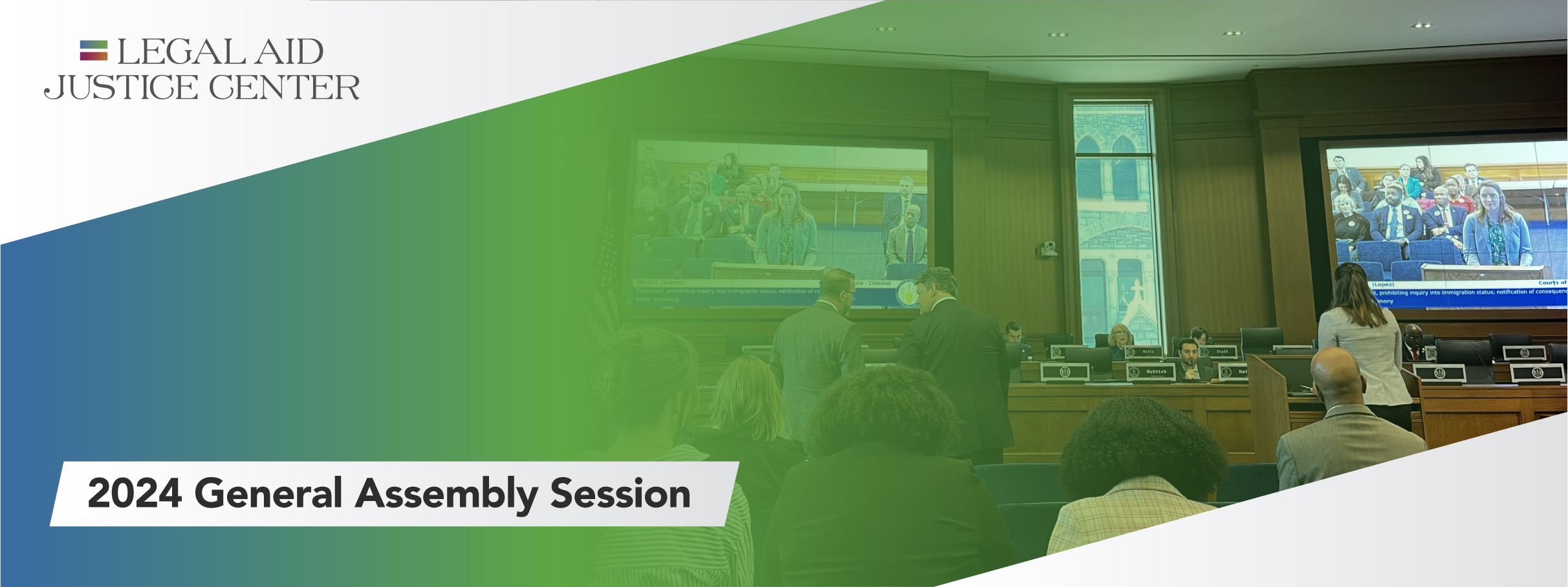
That’s a wrap! The 2024 Regular General Assembly Session officially ended on Friday, March 9. There were 3,594 bills introduced this session; 2,280 of those bills have passed and now await the governor’s actions. Governor Youngkin now has 30 days to sign, amend, or veto these bills before the April 17 reconvened session.
As we wait for the governor, we are continuing to advocate for our priority bills and budget items with the governor’s administration in the hope that he will sign some of them into law in the coming month.
- HB 824, Cousinscaps court-appointed attorney debt in Virginia. This bill passed with an amendment that means any increase in compensation for court-appointed attorneys will not get added to the fees charged to indigent defendants.
- HB 614, Priceallows work while incarcerated to offset court debt. Unclear parameters in the law and varied local practices have been leading to the denial of eligible requests to use work done while incarcerated to offset court debt, increasing the already overwhelming amounts of debt accumulated when an individual leaves a carceral setting. This legislation will require courts to accept these requests if they meet the requirements of the law.
- SB 514, Williams Graves/HB 612, Price delays when court debt is sent to collections. The current Virginia Code allows for an individual’s court debt to be sent to collections 90 days after a judgment is issued if they have not set up a payment plan or paid their bill in full. The proposed legislation would increase this to 180 days after a judgment. For those who are incarcerated that 180 days would begin after their release from incarceration. This will provide much needed space for people to handle the burden of court debt while also reducing debt collection fees.
- HB 246, Jones creates greater transparency for court fines with itemized court debt receipts. This legislation requires clerks to issue an itemized list of court-related charges to defendants upon assessment of court costs (including fines, fees, restitution, and any other costs). This list would be available whenever a payment is made, or upon request, to help increase transparency of fines, fees, and interest accrual.
- HB 1114, Simon creates court appearance fairness. This legislation, originally intended to end the criminalization of failure to appear entirely, was amended to eliminate separate failure-to-appear criminal offenses for those who are prevented from appearing due to incarceration.
- SB 625, Bagby/HB 896, Hernandez prevents the court from collecting a person’s social security benefits to pay court debt if that is their sole source of income. Currently, the Federal Code states that courts are unable to collect court costs from individuals whose sole income is Social Security. However, this does not always occur in Virginia, and this legislation ensures consistent compliance with federal law.
- HB 1496, Rasoul creates a registry for surveillance technology. This bill requires law enforcement to annually send a list of all surveillance technology deployed in their jurisdiction to the Department of Criminal Justice Services and requires that list of technology be shared with the Joint Commission on Technology and Science and the Crime Commission.
- HB157, McClure eliminates the farmworker exemption to minimum wage raises. A vestige of Jim Crow-era state laws, Virginia continues to exempt farmworkers and workers on H-2 migrant worker visas from the protections of the Virginia Minimum Wage Act (VMWA). This bill removes these exemptions.
- SB 246 McPike /HB 1454, Lopez extends the validity of the driver privilege cards and time-limited duration licenses to match a driver’s license. This will reduce barriers to reliable transportation for immigrant Virginia residents.
We are also continuing to support the work of the Fund Our Schools Coalition to ensure every child in public school in Virginia has access to high-quality education with wraparound support and services. The Fund Our Schools Coalition is carefully watching the budget process unfold and advocating for a final budget to include the investments the House and Senate prioritized in their budget. You can read more about school funding in the budget here.
As the regular session comes to an end, there are many advocates and community members to thank for their incredible efforts at the General Assembly this year. This work takes so much heart and courage, and dozens of people from the community, along with LAJC staff, invested countless hours to raise up community voices, push back on harmful policies, educate legislators, and support bills that, if signed into law, will empower many individuals and families.
Please continue to visit our social media pages for ongoing updates on the steps the governor’s administration takes on these bills and the budget. Thank you for your stalwart support and for being on this journey with us.
